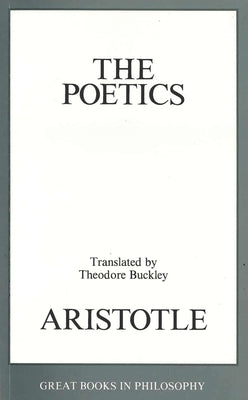1
/
of
1
Prometheus Books
The Poetics
The Poetics
Regular price
€12,95 EUR
Regular price
Sale price
€12,95 EUR
Shipping calculated at checkout.
Quantity
Couldn't load pickup availability
Analyzing the poetic genres of his own day, particularly epic and tragedy, Aristotle sets forth a comprehensive theory of the poetic art. In this seminal and highly influential work of ancient literary criticism, Aristotle discusses poetry's esthetic function as well as its emotional value, revealing at the same time the basic principles of literary art and giving practical hints to the poet.
Author: Aristotle, Theodore Buckley
Publisher: Prometheus Books
Published: 11/01/1992
Pages: 76
Binding Type: Paperback
Weight: 0.26lbs
Size: 8.47h x 5.38w x 0.31d
ISBN: 9780879757762
Author: Aristotle, Theodore Buckley
Publisher: Prometheus Books
Published: 11/01/1992
Pages: 76
Binding Type: Paperback
Weight: 0.26lbs
Size: 8.47h x 5.38w x 0.31d
ISBN: 9780879757762
About the Author
ARISTOTLE was born in the northern Greek town of Stagira in 384 B.C.E., where his father was the personal physician to the great-grandfather of Alexander the Great. At the age of eighteen Aristotle entered Plato's Academy and soon became recognized as its most important student. He remained under Plato's tutelage for nearly twenty years.
Share


